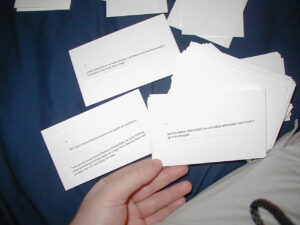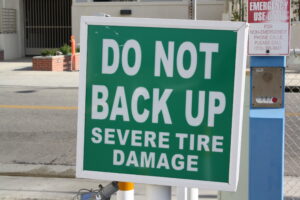I was just reading today about some rumors surrounding the system that’s being called, for lack of a better name, the XBox 720. It’s supposed to be coming out in late 2013 or 2014, which is bad for a couple of reasons. One, if they screw the pooch and don’t get it to hit that magical pre-holiday season shopping surge, they’re dead. Second, the entire console gaming industry could be as lively in 2014 as the current 8-track tape industry is today. But that’s not what shocked me about the news; neither was the fact that they’re moving to BluRay discs for their format. What threw me is the announcement that the new system won’t let you play used games.
This hasn’t been entirely clarified, but I’m guessing that games will force you to do some sort of online activation scheme, or otherwise be bound to your Microsoft ID. If you can’t beam home and lock that copy to your ID, you can’t play. This would probably be swaddled in some distraction, like saying “I’m going to go online now and download all of your COOL NEW GIANT BONUS GUNS!!” and then lock down the game while pulling down updates. The DIVX DVD player from a decade ago had a similar system, and failed miserably. It used a phone line to connect back to the mothership, like an old-school cable box did for PPV purchases, but now that every home (in theory) has wifi and ethernet and broadband, that part of the equation is less of a big deal.
I was just reading a J.G. Ballard interview where he talked about the influence of used book stores when he was younger, how he’d dig around these places after some old geezer kicked the bucket and his widow hauled off a century’s worth of book hoarding for six pence a title, and find among the pulp paperbacks the occasional gem. I used to do the same thing, partly because the prices were always good, but partly because the only other book stores around were Walden’s-type places that didn’t stock anything interesting, or maybe the occasional Border’s that would have the last one or two of an author’s works, at full cover price. I spent so much time poring over titles in basement stores, taking home books that looked cool, and occasionally stumbling onto something life-changing.
I did the same thing with CDs and music, too. I mean, I worked both sides of the deal, dragging a backpack of the lowest-rated titles from my collection every time I was broke and had to pay a massive phone bill or buy enough groceries to coast into next payday. But I’d often spent hours going from A to Z in those used CD places, trying to find something obscure, or just looking for bands I’d never heard, so I could try them out for half the price of a retail CD. I buy 100% of my music digitally now, and that experience is completely gone now. I can listen to 30-second clips of an artist’s songs in the iTunes store, and that’s helpful, but the entire tactile situation of running my fingers over five thousand plastic spines on jewel cases to find some obscure d-list band on Earache is gone.
I don’t know how big the used game market is these days, although at the height of my PlayStation 2 days, I’d frequently turn in the duds in my collection for store credit. I was always the kind of gamer that would be stuck on a single title for weeks and months on end, instead of having to get the latest games as they came out and then immediately solve them. I am guessing if you’re that kind of gamer, you probably use one of those Netflix-like game rental services, although this begs the question if they will also be screwed by a one-player-per-title system.
The main thing killing the console game system is another reason why the game-ownership system makes less sense. When you play something like Mafia Wars, you don’t buy the game; the client is your browser, and you “own” your online account. You don’t spend money buying a physical disk; you buy game currency or points or guns or upgrades or whatever else. I think more games will follow this WoW model where the client is either free or cheap, and you either pay for upgrades or pay per month or hour or whatever.
I’m also wondering if this will cause a “dark ages” in collecting of systems in the future. I can hop on eBay and hoard away any number of Atari 2600 titles. But will there be a point in ten or twenty years when the then-middle-aged person goes to buy all of the XBox720/PS4 games they didn’t have as a kid and be as screwed as that guy who built a replica Cray supercomputer and can’t boot it because nobody has an OS for it?








